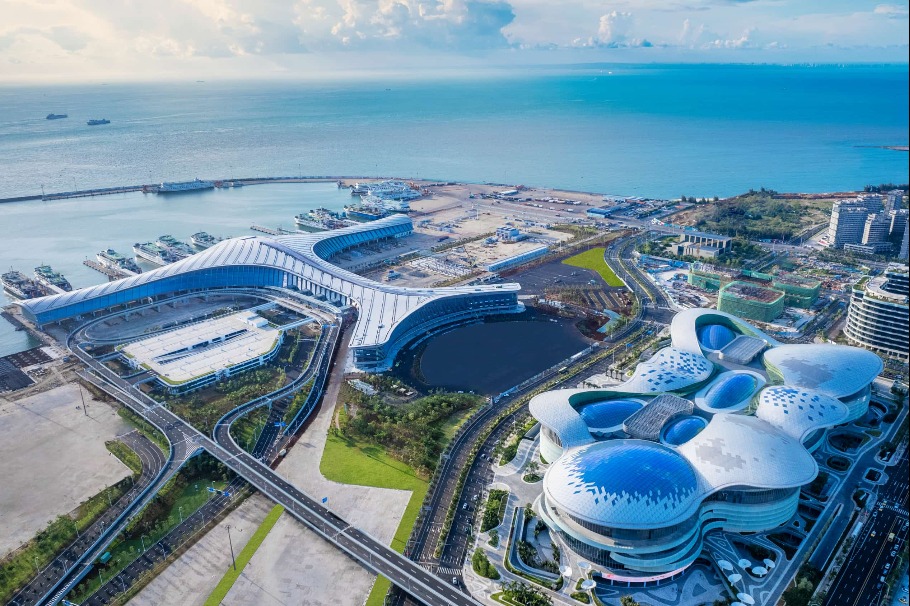China-Vietnam relationship: A pillar of regional stability
By Wilson Lee Flores | China Daily Global | Updated: 2024-08-27 09:06

The strengthening partnership between China and Vietnam, built on a solid foundation of pragmatic cooperation and mutual respect, stands out as a stabilizing force in Asia, vital for regional peace, sustainable economic growth and geopolitical stability. The visit to China by General Secretary of the Communist Party of Vietnam Central Committee and Vietnamese President To Lam from Aug 18 to 20 is likely to further consolidate ties between the two nations.
The China-Vietnam relation is a compelling example of how nations with a complex and sometimes even contentious history can forge a forward-looking and win-win relationship based on pragmatism, economic cooperation and goodwill.
Since normalizing relations in 1991, both countries have pursued a pragmatic and mutually beneficial path. Today, China and Vietnam are among the most globally competitive economies, which have successfully eradicated mass poverty and social injustices. Their partnership has evolved into a multidimensional relationship that encompasses trade, investment, infrastructure development and tourism, and heads toward a joint community of shared future. Such cooperation not only fuels the dynamic economic engines of both countries but also enhances the broader stability and prosperity of Asia.
Infrastructure development, particularly in the realm of modernizing rail links, illustrates the depth of this cooperation. The colonial-era railways, plagued by mismatched gauges and outdated technology, have long hindered seamless connectivity between the two nations. Recognizing this bottleneck, China has provided significant financial and technological support to Vietnam, facilitating the modernization of these critical links. This not only symbolizes the nations' shared commitment to overcoming historical challenges but also highlights their strategic vision of enhancing regional connectivity.
The visit by Lam further advances these efforts, with 14 agreements signed covering various fields, including infrastructure, healthcare and other critical sectors. This visit, strategically timed and diplomatically significant, underscores both nations' focus on collaboration over conflict, particularly in an era of rising global uncertainty.
The deepening economic ties between China and Vietnam over the decades have become increasingly significant in the face of global challenges. Vietnam has emerged as a key manufacturing hub for Chinese companies seeking to diversify their production bases, further entwining the two economies. This economic integration not only strengthens regional supply chains but also bolsters the resilience of both nations against external economic shocks.
Chinese private investment in Vietnam has surged, driving the country's rapid industrialization and modernization. This influx of capital and expertise is a direct result of the strategic choices made by the leaders of both nations, who have prioritized economic cooperation as a means of ensuring long-term stability and prosperity.
While the China-Vietnam partnership is robust, it is not without its challenges, particularly concerning territorial disputes in the South China Sea.
However, what sets this relationship apart is the manner in which these disputes have been managed. Leaders of both nations have opted for strategic diplomacy over confrontation, maintaining a continuous dialogue to prevent these issues from overshadowing their broader partnership.
Vietnam's "Four Nos" policy — no military alliances, no foreign military bases on its soil, no alignment with one country against another, and no use of force in international relations — has been central to this diplomatic balancing act. This policy has not only reinforced Vietnam's sovereignty and independence but has been cited by Roland Simbulan, the vice-chairman of the Center for People Empowerment in Governance, a public policy center in the Philippines, as a model of nonalignment that could be emulated by other Southeast Asian nations.
By keeping the South China Sea issue within the realm of bilateral negotiations, China and Vietnam have demonstrated a commitment to regional peace and stability. This approach has allowed both nations to focus on their shared interests and continue building on a strong partnership, offering a blueprint for other countries that are dealing with territorial or other disputes.
With both nations already working to implement the outcomes of Chinese President Xi Jinping's visit to Vietnam last year, Lam's visit to China focused on deepening the strategic partnership and a China-Vietnam community of shared future. High-level dialogues covered a wide range of issues, from expanding economic cooperation to enhancing connectivity and even addressing maritime disputes.
This visit is not just a diplomatic formality; it is a strategic move that reflects the importance both nations place on their bilateral relationship. By choosing China as his first overseas destination after becoming CPV general secretary, Lam is reaffirming the important role that China plays in Vietnam's foreign policy. This choice underscores the enduring friendship between the two nations and the strategic importance of their partnership in navigating the complexities of regional and global politics.
As the Asia-Pacific faces continuing socioeconomic and geopolitics uncertainties pushed by outside forces, the robust China-Vietnam partnership stands as a pillar of regional stability. The deepening ties between these two nations, marked by high-level visionary leadership and strategic diplomacy, offer an exemplary model of how countries can collaborate to achieve mutual benefits while managing differences.
The China-Vietnam relationship is more than just a bilateral partnership; it carries the potential to contribute to the future of Asia. As both nations continue to deepen their cooperation, their relationship will undoubtedly play a crucial role in promoting regional stability and economic development, offering a powerful example of the benefits of cooperation, pragmatic diplomacy and mutual respect, and serving as a cornerstone of peace, stability and prosperity in Asia.
The author is a multi-awarded columnist of Philippine Star, Abante and Bilyonaryo; economics and politics analyst; moderator of Pandesal Forum and TV host of "Industry Beacon".
























